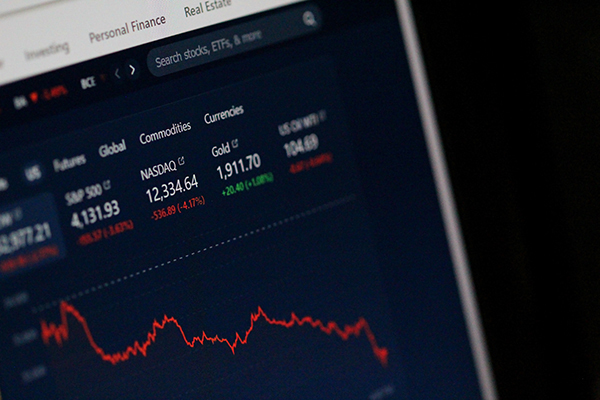The future of responsible investing

The future of responsible investing
July 27, 2022 | By Sevin Yeltekin
Earlier this year, we heard from Simon alumnus Dave Khani on the future of clean energy in the U.S. We continue our ESG series with Martin Jarzebowski, Director of Responsible Investing at Federated Hermes. In addition to leading ESG integration for one of the asset management industry’s largest stewardship and responsible investing divisions, Martin serves as an Adjunct Professor of Sustainable Finance at Simon. He is as passionate about investing in the next generation of finance leaders as he is about investing in opportunities that make our world a better place.
In this Q&A, he offers a view from the front lines of responsible investing.
What attracted you to the responsible investing/ESG space?
One of my first jobs out of undergrad was working for a U.S. senator and performing research for the Senate Banking Committee. This was during a period fresh off the Enron and WorldCom scandals, which ultimately led to the passage of the Sarbanes-Oxley Act to elevate financial disclosures. Inspired by my experience on Capitol Hill, I decided to pursue a master’s degree in London with a concentration in corporate governance. The term ESG had not yet been coined and the United Nations Principles for Responsible Investment had not yet been penned. Even then, though, it seemed like common sense that environmental, social, and governance factors would present both risks and opportunity in business. It’s information any prudent investor would want to know when researching an investment. ESG offers us a lens through which to better understand a company’s risk profile, uncover mispriced investment opportunities, and directly engage with a firm’s senior leadership to help them evolve and adapt to change. Its practical application goes to the heart of being a responsible owner and steward of capital. It’s exciting to work in a rapidly evolving space which is relevant around the world, across asset classes, public and private companies, and for all types of investment strategies.
Can you give us an overview of your role at Federated Hermes?
I serve as Director of Responsible Investing for Federated Hermes, which has over $600 billion in global assets under management across public equities, fixed income, liquidity, and private markets. A key component of my role is the design and management of our Responsible Investing Office, a cross-functional division leading the integration of proprietary ESG data analytics and corporate engagement for the firm. We’re fortunate to have a global team of more than 60 subject-matter experts dedicated to corporate engagement, stewardship, and responsible investing activities. This in-house ESG intelligence is centralized and specialized, which affords us the ability to create a full spectrum of responsible investing solutions, from integration to thematic to impact across different asset classes on a global scale.
What do companies gain when they factor ESG into their decision-making processes? What stones would go unturned were it not for adopting this framework?
From a macro perspective, every company needs to understand changing consumer preferences for
their products and the regulatory crosscurrents in which they operate. It’s the proverbial carrot and the stick. Corporations are constantly evolving to capture new market opportunities, enhance productivity, optimize assets, and mitigate risk.
At the micro level, this means a company’s board and management are striving to create a sustainable business model. If you break it down to its core, a sustainable business has growth prospects which are on trend, and leadership has the foresight to sidestep material risks. When evaluating a company’s products, you have to ask if the revenue stream is well-positioned for changing consumer preferences and regulations. Then, when assessing a company’s practices, you have to question if the operations are resilient or exposed to structural risks that can cause brand or reputational damage. Sound products and practices are equivalent to a good offense and defense. A sustainable business needs both dimensions to consistently create long-term value.
What are some trends to watch in ESG investing and reporting?
The first trend to highlight is the evolution of ESG data. Most ESG data and scoring systems
started on the basis of corporate disclosure aggregation. In other words, the score’s methodology is primarily based on what the company voluntarily self-reports in the public domain. As a result, many ESG scores are updated infrequently and can be backward-looking. Different vendors use different methodologies, which can lead to a company being labelled an ESG leader by one scoring system and an ESG laggard by another. ESG data is a helpful starting point for identifying red flags or controversies in the beginning of your research process, but it is not necessarily going to get you across the finish line. There is no substitute for doing your own forward-looking homework.
The second trend to point out is corporate engagement and stewardship. Investors are becoming more proactive owners of the companies in their portfolio. They’re increasingly going directly to the source for their ESG insights by engaging in a collaborative dialogue with the boards of directors and C-suites of the companies in which they invest. These interactions are useful for illuminating a company’s long-term strategy to address ESG risks, identifying underappreciated investment opportunities, and maintaining at the table to advocate for positive change. To this end, Federated Hermes retains an 18-year proprietary engagement database that monitors the ESG progress and momentum of thousands of companies around the world. High-touch engagement and in-house ESG intelligence is quickly becoming the future of active responsible investing.
In the event of a recession, what is the impact on ESG investing?
Each economic cycle is different, but we have some evidence from recent market downturns that taking sustainability into consideration may help us weather the storm. There is a growing body of research in the past decade which indicates the application of financially material ESG factors can be consistent with better performance over time. But it’s important to remember ESG is not a one-size-fits-all approach.
Some people like to think of ESG investing as simply excluding particular sectors or only owning consensus ESG darlings. But those approaches can be limiting, especially during periods of major sector rotations such as the first half of 2022. By completely excluding specific sectors of the economy, you constrict the investable universe and reduce diversification. This can serve as a double-edged sword as it pertains to investment performance. An alternative would be to invest in all sectors and incorporate a proactive engagement process that leverages ESG subject-matter experts to help decipher future winners and losers within each industry.
We should also think about the fact that investing only in companies with the highest third-party ESG scores can generate mediocre returns if those companies are overvalued. We are witnessing a lot of confusion in the marketplace today in terms of what constitutes a “leader” in ESG. Ultimately, the heart of successful investing, regardless of style, is the identification of mispriced securities. If you can use differentiated sustainability intelligence to recognize positive momentum and ESG improvers before the crowd, that could be a source of future excess returns. Where you are going is increasingly more important than where you’ve been in this space.
How can Simon Business School support the efforts of ESG practitioners?
The University of Rochester and Simon Business School have a rich tradition of analytical research and evidence-based education. Many people regard sustainability and ESG as thematic and mainly qualitative in nature. That perception is changing as the field of sustainable finance expands, as do the opportunities for more data-driven empirical work that showcases the economic value add. Sustainable finance is becoming increasingly quantitatively rigorous, which is where Simon shines.
Simon is also uniquely positioned to develop the next generation of responsible investors and corporate leaders. There is a wide array of new sustainable finance career opportunities for MBA candidates in corporate sustainability, accounting, consulting, data science, non-profits, and regulatory organizations. Simon’s leadership recognized this development early on and helped launch one of the first advanced MBA courses (FIN 441), dedicated solely to ESG and Sustainable Investing. In this course, Professor Daniel Burnside and I focus on the practical application of bridging the gap between sustainability and investing. I hope it serves as a foundation to build an evergreen curriculum and research initiatives around sustainable business.

Martin Jarzebowski is the Director of Responsible Investing at Federated Hermes and an Adjunct Professor of Sustainable Finance at Simon Business School.
Follow the Dean’s Corner blog for more expert commentary on timely topics in business, economics, policy, and management education. To view other blogs in this series, visit the Dean's Corner Main Page.











